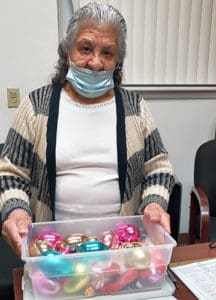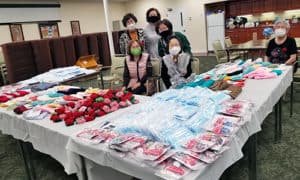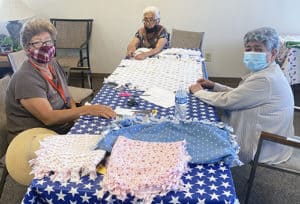Throughout Pandemic, Retirement Housing’s Project H.A.N.D.S. Volunteers Continue to Make a Difference in their Communities

The thousands of Project H.A.N.D.S. volunteers who live in Retirement Housing Foundation (RHF) communities across the country haven’t let the pandemic get in the way of their good works. These vital groups have continued to make and distribute items to folks who need them throughout the pandemic, a tradition that is now 15 years old.
Project H.A.N.D.S.® (Helping Angels National Donated Support) is a program in which residents and staff at RHF communities partner with local organizations to give back and help those in need. Participating Project H.A.N.D.S. groups hand make items that are then donated to their area hospitals and schools, shelters, and other local organizations.
The Project H.A.N.D.S. group at Mabel Meshack White Manor in Dallas, for example, recently put together dozens of hygiene bags for Streetside Showers, an organization that parks mobile showers in different locations each week to allow homeless persons to take a shower and receive other hygiene items they may need. For safety, the Mabel Meshack White Manor volunteers not to meet as a group to assemble the kits. Instead, each volunteer assembled bags in their own units, which were then collected and distributed to Streetside Showers.
Each Project H.A.N.D.S. group has its own flavor and network of community partners. Some communities knit, crochet, sew and quilt, creating blankets, sweaters, scarves, and other items. Other communities stuff backpacks with school supplies and fill personal care bags with toiletries. One community sewed 500 Christmas stockings for their local Police Department to distribute during the holidays. Another community grew vegetables in their community garden and donated a portion of the harvest to its local Salvation Army shelter.

One group, at MacArthur Park Tower in Los Angeles, is famous for donating knitted carnations to local nursing home residents for Mother’s Day gifts. This past Mother’s Day, some of the recipients were so grateful to receive the gifts during such a time of stress and isolation that they donated cash for the group to purchase yarn and other supplies for future projects. MacArthur Park Project H.A.N.D.S. members also distributed masks, emergency safety alarms, and lunch boxes to the residents when the community received donations from outside agencies.
There are countless other ways Project H.A.N.D.S. members use their time and talent to benefit others, too. At Olson Rotary Village, an RHF community in Delano, Calif., members make tie knot blankets out of receiving and swaddling blankets. These repurposed tie knot blankets are used by recipients as nursing covers, changing covers, and in many other ways.

Sometimes, individual members truly go “above and beyond.” Phyllis Coiner, for example, lives at Bishop’s Glen in Holly Hill, Fla. She makes more than 100 items each month for Project H.A.N.D.S. contributions. And while the residents and staff at various RHF communities who volunteer for Project H.A.N.D.S. are often referred to as “helping angels,” sometimes the groups also help the volunteers.
For Raquel Jimenez of Rio Vista Village in Los Angeles, Project H.A.N.D.S. is a lifeline of support. “We are not just neighbors at Project H.A.N.D.S., we are family,” she said. “I am going through a health crisis, and Project H.A.N.D.S. helps distract me from the pain and to have hope” (quote translated from Spanish, thanks to RHF).
Susan Lee, of La Mirada (Calif.) Vistas, has found hope during the pandemic, thanks to her Project H.A.N.D.S. group. “I am thankful to everyone who makes Project H.A.N.D.S. possible, because during COVID-19, it helped me cope with stress” (quote translated from Korean, thanks to RHF).
Project H.A.N.D.S. was the founded in 2004 by Judy A. Shaw, RHF’s director of service coordination, who was looking for a way for residents to be able to give back to their local communities. Since then, Project H.A.N.D.S. has grown exponentially. The most recent RHF newsletter lists at least 79 RHF communities that participate in the program, with more being added all the time. Each year, community residents make more than 20,000 items that are distributed to homeless shelters, hospitals, shelters for abused persons, children’s hospitals, and countless other nonprofit organizations.
One of the most unique aspects of this national program is that it is funded completely through donor support, not a line-item in the RHF budget. Donations are always welcome.
Join Our Mailing LIst
"*" indicates required fields
Follow on Facebook
Denise Buck to Succeed Campbell as IFM CEO - CHHSM
www.chhsm.org
As IFM Community Medicine (IFM) Founder and CEO David Campbell M.D. plans to retire mid-year, his successor, Denise Buck M.D., has started working full-time with IFM in St. Louis. Before assuming this...